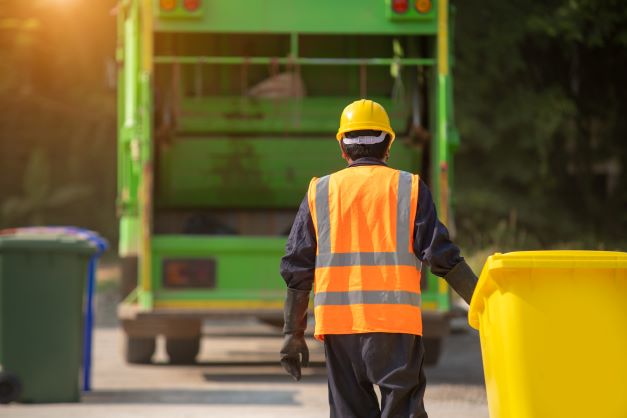When we think of waste management, the image that probably springs to mind is that of a man in an orange hi-vis vest sorting through a mountain of tra
When we think of waste management, the image that probably springs to mind is that of a man in an orange hi-vis vest sorting through a mountain of trash. The reality is far more complex and interesting than that, however. Waste management is a broad term encompassing many different roles and responsibilities.
With so many exciting roles on offer in this dynamic industry, it’s time to stop thinking of waste management as something you don’t want to do and start considering it as something you can’t resist doing. Here are some pointers on how to get started with a career in waste management.
What is waste management?
Waste management comprises all the activities and actions necessary to manage waste from its generation to its final disposal. In addition to waste collection, transportation, treatment, and disposal, monitoring and regulation are included. Furthermore, it covers the legal and regulatory framework concerning waste management, including recycling guidelines.
Waste management comprises of treating both liquid and municipal solid waste. During the treatment process, recyclable materials that are not considered litter or rubbish are provided with a variety of solutions for recycling. In light of our current environmental predicament, this sort of recycling is extremely significant for all households and businesses.
There are eight primary waste management techniques, each of which has numerous subcategories. Source reduction and reuse, animal feeding, composting, recycling, fermentation, landfills, incineration, and land application are all included.
What are the benefits of Waste Management?
Creates Employment
Creating and selling recycled goods is becoming increasingly popular, and this is creating hundreds of jobs in the recycling industry. As people become more eco-friendly, organisations producing recycled goods come to the forefront, boosting their business as well as creating hundreds of jobs.
Cleaner Environment
Managing and reducing waste leads to environmental protection in the long run. Besides safeguarding people from disease, waste disposal units also benefit them in other ways. The greatest benefit is that all of this occurs while waste is properly and hygienically discarded.
Waste reduction and reused organic waste can have a positive effect on society and the world at large, regardless of whether we are able to scrap all garbage. By setting an example for those around you, you can inspire them to adopt a more environmentally friendly approach.
Reduces Pollution
When waste is handled the proper way instead of disposed of in a landfill, it not just eliminates future waste but also reduces the harm and intensity of unwanted hazardous greenhouse gases such as carbon-di-oxide, carbon-mono-oxide, and methane (air pollution), which are often emitted from accumulated landfill waste.
Cutting down on the many factors that negatively impact our environment by reducing our reliance on landfills is tremendously important and increasing pollution control.
Saves Energy
The recycling of paper is one of the biggest aspects of waste management, and it helps conserve energy over time. The energy-saving advantage of recycling can be attributed to this practice in particular.
It’s common knowledge that paper is made from trees, so saving trees by trying to recycle used paper instead of cutting down fresh trees is an effective way to conserve energy and reduce your carbon footprint.
Waste Management Overview
The sector dealing with resources and waste management in the UK is said to be worth £9 billion annually and to involve recycling, treatment, reprocessing, disposal, and the generation of energy from waste, among other things.
Every household and business across the UK utilises waste services, collecting and safely handling a wide range of waste materials and products, including food waste, discarded electronic and electrical equipment, chemicals, and healthcare waste.
The sector protects the environment and improves resource efficiency by securing valuable materials so they can be transformed from waste into new industrial feedstocks. Net zero emissions can be achieved by securing valuable materials and transforming them from waste into new feedstocks for industry.
Waste and secondary resource management is an important part of the UK economy, providing 150,000 jobs and £7 billion in GVA, as well as being a growing sector. Through the provision of high-quality secondary raw materials and feedstocks, this sector can help improve resource availability and security across the whole economy.
Energy and Utility Skills (2017) research suggests that the UK resources and waste sector employs 134,300 people, most of whom are frontline workers. In addition to the increasing demand for qualified employees to help improve the management of resources and waste over the next 30 years, there will be a need for more people to work in waste and recycling facilities.
How to get started in the Waste Management Industry
As with most industries, it’s best to network with current professionals in the waste management sector. This can help you find out more about potential careers, as well as potential employers. Find out if there are any waste management clubs or associations in your area. If there are, you can attend their meetings to network with potential employers, as well as other graduate students.
For a career in waste management, you’ll likely need to work in a team environment. Working well with others, and building relationships with your team members, is key to success in this industry.
If you have a genuine interest in the industry, employers will be able to tell. They’ll appreciate your enthusiasm, and you’ll have a better chance of finding the right fit for you. You could also apply for internships in the waste management sector. This will give you a chance to experience the industry, and decide if it’s right for you.
What Qualifications do you need?
Waste and resource management qualifications are available in a variety of forms. Because distance learning is also available, qualifications can be customized to suit a wide range of needs and preferences. The following is a list of academic programmes that are currently recognised or accredited by CIWM.
Undergraduate Qualifications
Higher National Certificates
- University of Northampton – HNC Wastes Management
- Fife College – HNC (SCQF Level 7) Sustainable Resource Management
- Waste management is usually considered relevant to geography degrees, and most people working in this field have one.
Postgraduate Qualifications
Masters Degrees
- Cranfield University – Environmental Engineering MSc
- University of the West of Scotland – MSc/PgD Waste & Resource Management
- Glasgow Caledonian University – MSc Environmental Management (with pathways Waste, Energy, Water, Oil and Gas)
- University of Northampton – MSc Advanced Industrial Practice (Wastes Management)
- A postgraduate qualification in waste management or environmental engineering could be useful but is not strictly necessary.
CIWM (WAMITAB) Qualifications
Qualifications are developed and regulated for those working in resource management and recycling, cleaning and street cleansing, facilities management and parking from operative to management level by CIWM (WAMITAB).
Other Qualifications
- Apprenticeships in Sustainable Resource Management
- Professional Diploma in Waste Management
Being a member of the Chartered Institution of Wastes Management can help you gain knowledge about the industry and gain some institutional recognition. They offer a wide variety of membership packages, including a substantial student discount.
CIWM supports all kinds of learning, from vocational qualifications and apprenticeships to university degrees.
Jobs in the Waste Management industry
Of course, there are many other jobs in the waste management sector. If you want to work in waste management, but don’t want to do the hands-on work of collecting and transporting waste, there are plenty of options available to you. Some job examples below include:
Waste management supervisors are in charge of ensuring that waste management processes are performed as they should be. They also oversee the work of their team members.
Waste management engineers research ways of improving the efficiency of waste management processes. They find ways of waste dumping more safely, and generate more energy from it.
Waste management analysts study waste management processes, and make recommendations for improvement. They work with engineers, scientists, and other analysts to improve waste management departments.
Red Kite Waste is a specialist recruiter in the waste management industry. We specialise in finding the best talent for vacancies across the UK and Ireland. They are looking to connect with those companies that have jobs available in this sector. If you would like us to help you find your next job opportunities in waste management, please send us your vacancy details now and we’ll be in touch quickly to begin the search and selection campaign. Our network swiftly connects the best talent with the right jobs.
Final Thoughts
The end goal of the management of waste is to reduce the amount of all waste produced. This means that waste management professionals are playing an important role in the fight against climate change. If you’ve been considering a career in waste management, now is the time to get started. The longer you wait, the more competition you’ll have on your hands. There are many different roles available, so there’s something for everyone.




COMMENTS